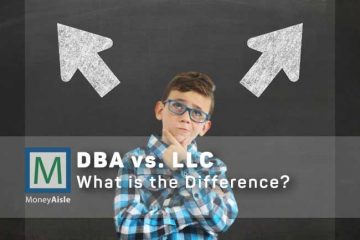Yes, it is possible to have multiple businesses under one Limited Liability Company (LLC). Whether you own a garment business and want to sell shoes as well, or you are a restaurateur and wondering about opening a wine shop, you certainly can operate two or more businesses under one LLC.
Diversifying your income by grabbing any new opportunity is a sound strategy. It is especially worth it in uncertain situations like we are facing in the current pandemic, so if you are thinking of starting a second business or already operating multiple businesses, “what is the best way to structure each business” legally might be nagging you continuously.
You can legally structure multiple businesses under one LLC by either:
- operating all your businesses under a holding company (one LLC name), or
- registering DBAs (“doing business as”), aka Assumed Business Names or Fictitious Names
You can get your LLC registered at any time by DIY or by hiring professional LLC formation services.
Generally speaking, there are pros and cons of each approach. There is no clear-cut answer on which one is better, as the best option always depends on your personalized needs. This article will discuss some general advice, but you can speak with an attorney or CPA about the specific details of your situation.
Pros and Cons of Running Multiple Businesses Under One LLC
Advantages:
- Lower formation costs (one Article of Organization, EIN, etc)
- Lower maintenance fee (one LLC annual report)
- Simpler at the start (could be complicated once businesses start to grow)
- Easy to test business models, products, and offerings, etc.
Disadvantages:
- Greater liability risks (all liability under one “umbrella”)
- non-separate finances and books could be confusing
For Whom Running Multiple Businesses Under One LLC Best Suited?
Less experienced business owners or Entrepreneurs with Low budget
Entrepreneurs who are less experienced or short in budget usually opt for running multiple businesses under the roof of one LLC. The reason for choosing this model is that the business owners are new in the market and have lesser experience with that particular business.
Such business people perceive their risk to be very high and are testing out business models. Moreover, having multiple business activities under one LLC has lesser filing and maintenance costs.
However, your other businesses under your LLC are also at risk if your one business faces liability. Let’s assume you run a landscaping and pest control business under one LLC; if a customer sues your pest control business, your landscaping business also has to share the liability. In addition, if you are running one business online and one has a physical store, still one business facing a lawsuit jeopardizes the other.
Experienced Business Owners
Entrepreneurs who know the market and businessmen with established profitability usually decide to “do it right” from the start. They form separate LLCs for each business and keep the liability discrete.
In such cases, you have to pay a little extra: filing separate Articles of Organization, business license, EIN, annual report, and taxes. However, experienced business persons consider it worth it as it serves the purpose; protection against liabilities. If you have registered your meat shop and vegetable store as separate LLC, one facing unforeseen circumstances will not affect the other.
Acquiring Separate DBA For Each Business Under One LLC
Many business owners choose to register as one LLC and acquire separate Doing Business As (DBA) for their businesses. For example, you own a store that sells beauty products with the name of Ashley’s Beauty and owns a spa with the name of Ashley’s spa. You are running both of these under one LLC, Ashley’s Beauty & Beyond.
Having a separate DBA is a sound strategy for marketing and branding purposes. Moreover, your filing and maintenance cost reduces as you do not have to pay separately for each business. However, if one of your DBAs is sued, the other DBAs under the same LLC are still liable.
Series LLC for Multiple Businesses
Many entrepreneurs are now experimenting with series LLC. However, it is a relatively new concept, and many service providers, attorneys, banks, accountants are still unfamiliar with this series LLC concept.
Series LLCs was first enacted in Delaware, followed by several states, including Illinois, Tennessee, Oklahoma, Iowa, Nevada, Utah, Texas, and Puerto Rico. Some states, such as California, do not allow for series LLCs.
This concept is enticing since this model provides legal separation of each business. Each series operates as a separate entity with a unique name, bank account, and separate books and records. Hence assets owned by one series are shielded from the risk of liability of other series under the master LLC or holding company.
Moreover, formation and maintenance cost is lower as there is only one annual franchise tax payment to the State, one annual Registered Agent Fee. Real estate investors usually utilize this model with several properties. Moreover, this model also works well for companies that own multiple brands.
Bottom line
None of the models mentioned above is absolutely right or wrong for everyone. Only you know your specific situation and personalized needs; hence, only you can pick which model will work best for you.
We hope this article has given an overview of whether multiple businesses should be run under one LLC or multiple LLCs.

Aisha Noreen is an owner of a small business with more than 9 years of experience in the marketing industry. With the wisdom of an old soul, she always seeks innovation and mind-blowing ROI techniques. Her unique approach helped many small businesses thrive and she can surprise you in many ways as well. Believe it or not, her energy, passion, and creativity are contagious enough to transform your business and take it to another level.









